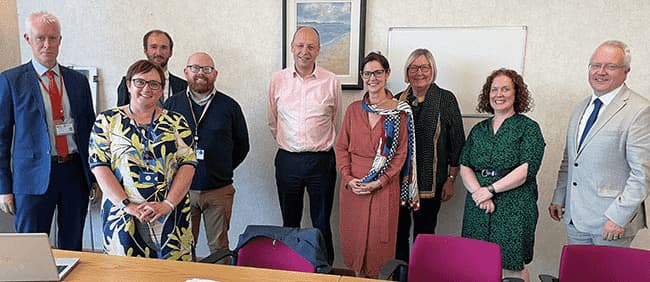Disconnect between fees paid and cost to deliver
We emphasised the reasons why dental reform must take on new urgency and be adopted as a top priority for the Department of Health and its new Permanent Secretary. And we deployed real-life examples where Health Service fees cost practitioners to deliver or are wholly inadequate to be able to deliver sustainable dental care and provide adequate reward. After years of stagnation and delay, we emphasised how vital it has become to get dental reform over the line at a time when the pressures in HS dentistry are so severe that the very future of HS dentistry is at stake.
The pressures in HS dentistry are so severe that the very future of HS dentistry is at stake.
We stressed the total disconnect between the fees available under a 30-year-old contract model, and the actual cost to deliver HS dentistry. Earnings had already reduced by 40% in real terms pre-pandemic and now, practitioners are bearing the brunt of soaring expenses as inflation rises, as well as the continued impact of COVID.
To illustrate the strain this is placing on dentists, we presented real-life case studies of some loss-making treatments and their impact to Associates. The case studies were presented at practice level and highlight just how financially unsustainable the current GDS contract has become. We also spoke of the importance of interim solutions, including continuing the RSS enhancement at least at its current rate until a new contract can be put in place.

Left to right: Donncha O’Carolan, Caroline Lappin, Robbie Davis, Michael O’Neill, Peter May, Ciara Gallagher, Roz McMullan, Ann McAreavey, Peter Crooks
Progress on workforce issues
We highlighted the importance of having a Dental Workforce Plan, completing work that has laid dormant since 2018 to ensure we have the workforce that we need. Pay disparity issues that are impacting on our attractiveness to recruit Hospital trainees were raised by us, as well as the absence of Clinical Excellence Awards and Pensions mitigations. A long-awaited CDS Workforce Review must take place, at a time when 40% of CDS dentists are approaching retirement and a significant backlog of care is impacting on staff morale and oral health outcomes.
A long-awaited CDS Workforce Review must take place.
And we put forward solutions. We have asked the Department to commission a third-party study to consider the actual costs and time required to provide HS dentistry. The study would provide an objective evidence base to inform a new contract. We also put forward the application of a dental inflation indicator to address increased expenses so that pay uplifts are true increases. We also voiced our support for an updated Oral Health Strategy pending completion of the Oral Health Options work that is underway.
Peter May listened, took notes of our key asks, showed our delegation respect and provided us with a good hearing. These are small, but essential components in being able to do business together.
So, was the meeting a success? The Permanent Secretary concluded our meeting by agreeing the importance of prioritising work around GDS Contract reform and a Dental Workforce plan. Our hope is that we will start to see real movement and progress over the coming months that can start to put in place solutions.
Looking ahead
We expect imminent movement on the Dental Workforce Review, and a mechanism to be able to take forward the strategically important workforce needs of the profession. The next GDS Contract Reform group will meet again later this month around taking that pressing piece of work forward.
Drawing on over 20 years’ experience of working in various aspects of policy, I believe we are now seeing the Department primed to move forward on our issues. This follows years of lobbying to have dentistry’s issues raised. We will seek to shape those conversations in the months ahead for the good of the profession.
While we’ve won the reform argument, we know the wider budgetary context remains difficult. Securing extra investment into GDS will continue to be a challenge, and that is precisely why we must ensure dentistry’s needs are well understood. It remains to be seen if the wheels of the government can turn quickly enough to deliver the solutions the profession needs to transform the GDS into a financially viable and rewarding area to work for the future.

